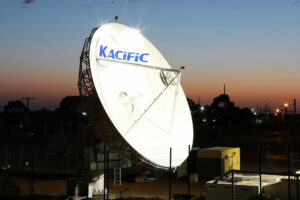PRESIDENT Ferdinand R. Marcos, Jr. has directed two departments to pursue talks with Kacific Broadband Satellites Group to explore how it can aid in digitizing the government, the Palace said.
Mr. Marcos and the Secretaries of Information and Communications Technology and of Science and Technology met with the Kacific executives led founder and CEO Christian Patouraux to discuss the Philippines’ plans for going digital, the Palace said in a statement.
Kacific, a Singapore broadband satellite operator based, is set to launch a second satellite, Kacific2, to expand and improve the reliability of its internet services.
After the meeting, the president directed the two departments to “continue with the talks with Kacific to determine the specific terms on how the company can boost the country’s digital capability,” the Palace said.
Information and Communications Technology Secretary Ivan John E. Uy said Kacific2 “could benefit the Philippines with additional bandwidth to help the economy through the propagation of the digital economy.”
The Palace said state-owned National Development Co. (NDC) is considering an investment in Kacific2 “through the acquisition of frequency block, including the naming rights to the broadband satellite.”
It said the NDC will partner with a Philippine company to roll out broadband satellite services from the Kacific2 to rural areas.
“Broadband services offered by Kacific2 could enable government-to-government communications from specific central offices to remote constituents and also support the existing government initiatives that promote better internet connectivity such as Free WiFi for All Program, the National Broadband Program, and the eGOV PH super app,” the Palace said.
Kacific Broadband Satellites, founded in 2013, aims to provide reliable, fast, and low-cost satellite internet to homes, businesses, and public agencies in the Asia-Pacific.
In 2019, the company launched Kacific1, a High Throughput Satellite providing high-speed, low-cost, and reliable broadband to rural and suburban areas of the Pacific and Southeast Asia. — Kyle Aristophere T. Atienza

